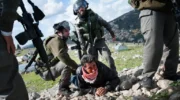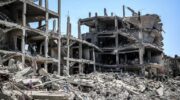Whistleblower testimonies detail practices to which Palestinian prisoners have been subjected, including being strapped down to beds while blindfolded and made to wear diapers, having unqualified medical trainees conduct procedures on them without anesthesia, having dogs set on them by prison guards, being regularly beaten or put into stress positions for offenses as minor as peeking beneath their blindfolds, and having zip-tie wounds fester to the point of requiring amputation…
BY QASSAM MUADDI, reposted from Mondoweiss
Israel’s genocidal war on Palestinians since last October has extended beyond the daily mass death, displacement, and starvation of the civilian population in the Gaza Strip. Behind the bars of Israeli prisons, Israel has been waging war against Palestinian prisoners, creating conditions that make the continuation of human life impossible. The effects of this brutal campaign have reverberated among prisoners’ families outside of jail, who are watching their loved ones being systematically starved, beaten, tortured, and degraded.
Shortly after October 7, Israel imposed a new set of rules in its cell blocks. In some detention centers like Ofer near Ramallah, the Israeli army was reportedly handed over control of the prison, while the Israel Prison Services guards were given a free hand in dealing with Palestinian inmates inside the jail sections. This shift was accompanied by a dramatic increase in the number of Palestinian detainees who were arrested after October 7, doubling the prisoner population as early on as mid-October. This included prisoners from Gaza, for whom the hardest part of the treatment was reserved.
In mid-May, CNN released an exposé based on the testimonies of Israeli whistleblowers about the horrific treatment of Palestinians from Gaza at the Israeli military base of Sde Teiman, now containing a detention center.
The whistleblower testimonies detail a number of medieval practices to which Palestinian prisoners have been subjected, including being strapped down to beds while blindfolded and made to wear diapers, having unqualified medical trainees conduct procedures on them without anesthesia, having dogs set on them by prison guards, being regularly beaten or put into stress positions for offenses as minor as peeking beneath their blindfolds, having zip-tie wounds fester to the point of requiring amputation, and a host of other horrific measures.
Detainee testimonies repeated many of these same accounts but also included additional disturbing accounts of sexual violence, including testimonies of rape and forcing detainees to sit on metal sticks that caused anal bleeding and “unbearable pain.”
On June 6, the New York Times published another story about Sde Teiman based on interviews with former detainees and Israeli military officers, doctors, and soldiers who worked at the prison, bringing new horrors to light about the treatment of Gazan prisoners. Detainee testimonies repeated many of these same accounts but also included additional disturbing accounts of sexual violence, including testimonies of rape and forcing detainees to sit on metal sticks that caused anal bleeding and “unbearable pain.”
Other depravities have been documented in several other prisons, often gloatingly by Israeli news channels who broadcast scenes of the abuse, including degrading treatment, in what can only be described as snuff films. Israeli prison doctors have assisted in the torture of Palestinian detainees, both before and after October 7. Alongside these acts of torture and humiliation, prison authorities have severely restricted prisoners’ food intake to the point of near-starvation, giving 20 prisoners enough food for two people.
The picture that emerges is one in which Israeli authorities are putting Palestinians in animal-like conditions calculated to torture, humiliate, and in man cases, to bring about their death. In March, the Israeli daily Haaretz reported that some 27 Palestinian detainees had died in detention in two facilities, including Sde Teiman.
Meanwhile, the families of Palestinian detainees, both from Gaza and the West Bank, have been left to wonder about the fate of their loved ones for months on end as horror stories continue to trickle out of Israeli prisons from those who are released, further feeding the anxieties of the families.
Death by beating
According to Palestinian prisoners’ rights groups, Israel has arrested no less than 8,800 Palestinians since October from Gaza, the West Bank, and Jerusalem. Many have been released, including as part of a prisoners’ exchange between Israel and Hamas in November. Currently, some 9,300 Palestinians continue to be held behind bars, including 78 women, 250 children, and more than 3,400 detainees without charge or trial under the military legal system of administrative detention.Thaer Taha, a Palestinian in his forties, was one of them until last April when he was released after two years of administrative detention. Taha was arrested in May 2022 and was given a detention order of six months. By October 7, he had spent almost a year and a half in Israeli jails.
“The day his detention order expired, we prepared ourselves to welcome my father at home,” Guevara Taha, his 22-year-old daughter, told Mondoweiss. “My mother made his favorite meal, my siblings and I dressed up, and friends and family members prepared to receive him at the checkpoint,” says Guevara. “That day, the lawyer called us and said that the occupation had renewed my father’s detention order for another six months,” she recalls.
On October 7, Thaer Taha was a month away from ending his second detention period. Since his arrest, he had been receiving family visits once a month.
Then, everything changed. Israel suspended all family visits for Palestinian inmates and began a series of unprecedented repressive measures against them. “Even those who had experienced the occupation jails in the 1970s and the 1980s said that they had seen nothing like the past eight months in the occupation’s prisons,” Thaer Taha says, referring to past periods that had hitherto been regarded as the highest point in Israel’s repression of Palestinian prisoners.
“Even those who had experienced the occupation jails in the 1970s and the 1980s said that they had seen nothing like the past eight months in the occupation’s prisons.”
Thaer Taha
“The organized daily life inside cells, which so many [prisoners] had struggled for over the years, suddenly disappeared. Books and other personal belongings were confiscated and we were no longer allowed to have any kind of activity or representation,” explains Taha. “Guards began to violently raid our cells on a daily basis, food quality immediately decreased, and covers were taken away. We were intentionally put into insecurity, hunger, and cold. At the same time, the cells became crowded. We were 12 people in a 9 by 4 meter cell.”
The worsening of detention conditions for Palestinian inmates had already begun before October 7. In February 2023, Israel’s security minister Itamar Ben-Gvir began to reduce water access for Palestinian prisoners, beginning by limiting shower time to four minutes per day. The step caused outrage among human rights groups at the time. After October 7, it went to a whole new level.
“In mid-December, our water supply inside each cell was reduced to one hour per day. We used this hour to store as much water as we could, and since we only had one bottle in the cell, we filled empty cans,” Thaer says. “This situation continued for three months, until the beginning of the month of Ramadan, in mid-March.”
In November, Hamas and Israel struck a prisoner exchange deal. Around 150 Palestinian women and children were released from Israeli jails in exchange for 50 Israeli captives. The released Palestinians gave testimonies of severe beating and sexual abuse by Israeli prison guards. In April, the Palestinian prisoners’ rights groups said that 16 identified Palestinians had died in Israeli jails as a result of mistreatment since October 7. More had died but weren’t identified.
In November, 38-year-old Palestinian Thaer Abu Asab was announced dead in the Negev prison, after being beaten by Israeli guards. A month later, Israel admitted that Abu Asab’s death was a result of being beaten by 19 prison guards at the same time.
“I was in the Negev prison when Thaer Abu Asab was killed, but in a different section,” remembered Thaer Taha. “It was November 18, just after the morning head count, when we began to hear a lot of screaming. Then some prisoners were moved to the section I was in and they told us what had happened.”
“The guards were very aggressive during the morning count and every day they beat someone. That morning, Thaer Abu Asab dared to ask one of the guards about the news, if the truce in Gaza had begun or not,” Taha continued. “The guard told his commander, who told Abu Asab that he would show him the truce in Gaza, and he ordered him beaten. They beat him so brutally that one of the guards struck him with a thick wooden hoe handle on the head, and he immediately lost consciousness and bled to death.”
The suspected guards were reportedly put under “strict restrictions” following a probe into the incident but were set free all the same. National Security Minister Itamar Ben-Gvir said that the guards were dealing with “the scum of humanity,” and should not be smeared before an investigation.
Cut off from the world
While this news was being made public, prisoners’ families had no contact with their loved ones in Israeli jails and had no idea about their conditions. Guevara Taha described it as “a constant anguish, thinking all the time about what could be happening to my father, what conditions he is in, preventing us from sleeping.”“We the families of prisoners have Whatsapp groups where we exchange information, so whenever a lawyer manages to know anything about one prisoner in a given jail, or if a prisoner manages to access a phone and make contact, they would give information about those who are held with them, and we share that news on WhatsApp,” said Guevara. “We spent all the time on WhatsApp expecting any news, and the news was never encouraging. It was either that they had no access to water, food or electricity, and the anguish continued.”
“My father spent 13 years in jail, eight of them as an administrative detainee, so I grew up knowing his news from prison more than having him at home, to the point that I didn’t get used to calling him ‘dad,’ I just called him by his name,” she continued. “But this time it was different, I was seriously fearing for his life, thinking of whether he has eaten or if he can even sleep at night.”
In February, a report by UN experts concluded that some Palestinian prisoners had been subject to sexual abuse and that at least two female prisoners had been raped in Israeli jails. The next day, Palestinian prisoners’ families and rights groups held a public press conference in Ramallah, where they announced that they had halted all coordination with the International Committee of the Red Cross, accusing it of inaction.
“The Red Cross had stopped giving us updates on the prisoners’ conditions since October 7, and even though they told us that it was because the occupation authorities had banned them from visiting the prisoners, they didn’t do anything else about it, and they didn’t speak up,” exclaimed Guevara.
Her father adds, “Our lawyers have been and continue to be banned from visiting prisoners, intimidated, and prevented from doing their work, but they speak out, they denounce it, and the prisoners were very offended by this silence.”
In November, the ICRC said publicly that it “hasn’t been able to visit Palestinian detainees since October 7.” In January, ICRC’s Middle East director told media outlets that Israel and Hamas were banning it from visiting captives on both sides. The ICRC never called publicly to end the suspension of visits, and has maintained that it is “actively engaging with the relevant authorities on this critical matter in our usual bilateral and confidential dialogue.”
Although Israel began to allow some family visits in recent months, most Palestinian prisoners remain banned from any contact with their families.
“Between October 7 and my release in late April, I was not allowed a single family visit, and my lawyer was allowed to visit me only twice,” indicates Thaer Taha. “During my time in prison, shortly after October 7, my son who is 17 was wounded by an Israeli bullet in the leg while taking part in a protest. I didn’t learn about it until my release in April. That is how cut off prisoners have been from the rest of the world.”
Many related articles here.Qassam Muaddi is the Palestine Staff Writer for Mondoweiss.





